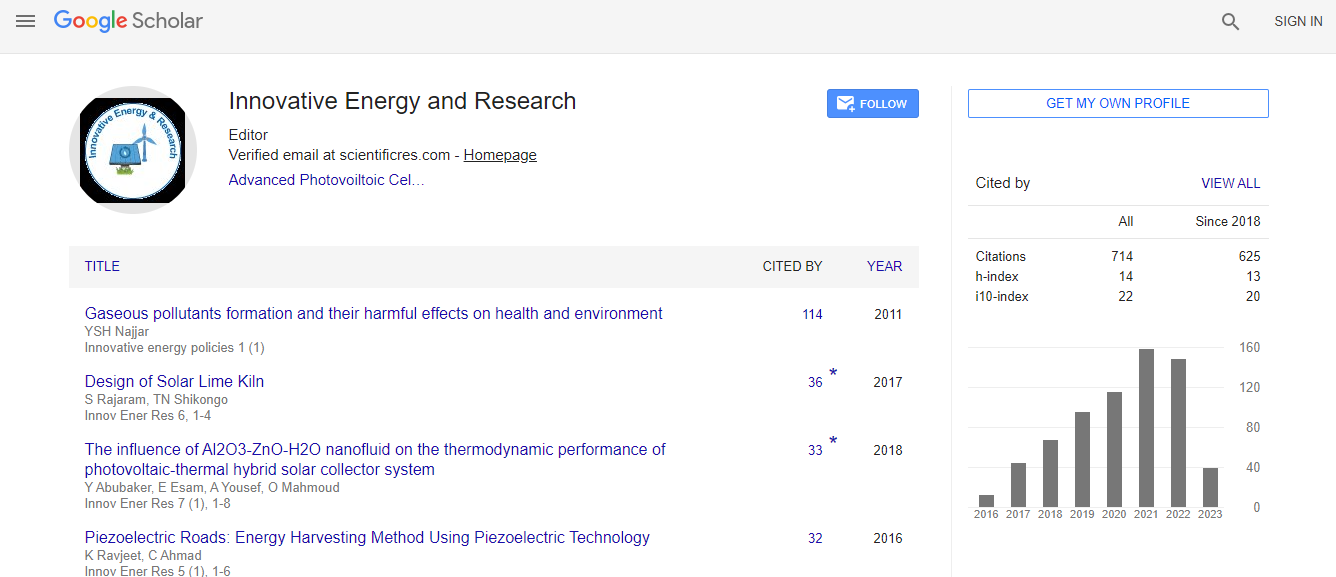Our Group organises 3000+ Global Events every year across USA, Europe & Asia with support from 1000 more scientific Societies and Publishes 700+ ������ Journals which contains over 50000 eminent personalities, reputed scientists as editorial board members.
������ Journals gaining more Readers and Citations
700 Journals and 15,000,000 Readers Each Journal is getting 25,000+ Readers
Citations : 712
Indexed In
- Google Scholar
- Open J Gate
- Genamics JournalSeek
- RefSeek
- Hamdard University
- EBSCO A-Z
- Publons
- Euro Pub
- ICMJE
Useful Links
Recommended Journals
Related Subjects
Share This Page
Organic biosourced phase change materials for seasonal thermal energy storage
20th International Conference on Advanced Energy Materials and Research
Marie Duquesne
Bordeaux INP - CNRS, France
Keynote: Innov Ener Res
DOI:
Abstract
Our work focused on thermal energy storage in a seasonal basis for heating and domestic hot water supply in buildings. The objective is to develop and study innovative organic bio sourced phase change materials (PCM) able to compete with water and surpass the performances of commonly used PCM today (low cost, high energy density, compactness, thermal losses reduction, environmentally friendly etc.). Sugar alcohols (SA) and their blends could provide high storage energy densities in the range of 120–190 kWh/m3 at temperatures inferior to 100°C with limited thermal losses due to high undercooling. They are compatible with commonly used container materials and with cheap solar collectors. They present long-term stability (no separation, no segregation, controllable thermal degradation) and moderate-to-low volume changes. Their prices are acceptable. First, a screening of SA and SA-blends to select the ones with melting temperatures inferior to 100°C was done. Then, an experimental characterization of the selected SA and SA-blends was performed. This encompasses the measurements of their melting point, their latent heat of fusion and the experimental determination of all key physical properties (specific heat, thermal conductivity, thermal diffusivity, density, viscosity) as a function of the temperature. The activation of the energy discharge process (crystallization) is difficult and the subsequent crystallization rates (discharge powers) are very low. Therefore, it was important to find out an easy to implement and efficient solution to discharge the storage system at the required power when needed. When the energy is needed, the storage system is discharged by activating SA crystallization using the efficient method found out in previous step. The associated discharge power depends on the SA crystal growth kinetics. The final step aims at measuring and modeling crystal growth rates in undercooled melts of SA and SA blends according to the temperature and determining the involved crystal growth mechanisms. Recent Publications 1. E Palomo Del Barrio, R Cadoret, J Daranlot and F Achchaq (2016) Infrared thermography method for fast estimation of phase diagrams. Thermochimica Acta 625:9-19. 2. E Palomo Del Barrio, R Cadoret, J Daranlot and F Achchaq (2016) New sugar alcohols mixtures for long-term thermal energy storage applications at temperatures between 70°C and 100°C. Solar Energy Materials and Solar Cells 155:454-468. 3. E Palomo del Barrio, A Godin, M Duquesne, J Daranlot, J Jolly, W Alshaer, T Kouadio and A Sommier (2017) Characterization of different sugar alcohols as phase change materials for thermal energy storage applications. Solar Energy Materials and Solar Cells 159:560-569. 4. H Zhang, M Duquesne, A Godin, S Niedermaier, E Palomo del Barrio, S V Nedea and C C M Rindt (2017) Experimental and in silico characterization of xylitol as seasonal heat storage material. Fluid Phase Equilibria 436:55-68. 5. A Godin, M Duquesne, E Palomo del Barrio, F Achchaq and P Monneyron (2017) Bubble agitation as a new low intrusive method to crystallize glass-forming materials. Energy Procedia 139:352-357.Biography
Marie Duquesne defended her PhD: Resolution and reduction of a non-linear energy storage model by adsorption on zeolites in 2013. She is an Associated Professor at the National Polytechnic Institute of Bordeaux since 2015 and Researcher at Trefle Department (Fluids & Transfers) of the I2M and a member of TESLab (Thermal Energy Storage Laboratory), I2M/Abengoa Joint Research Unit. She has expertise in thermal energy storage at low-to-medium temperatures and contributes to an ANR Project SIMINTHEC (National Project, 2008-2011) and to the European FP7 SAM.SSA Project (Sugar alcohol based material for seasonal storage applications, 2012-2015).
E-mail: marie.duquesne@enscb.fr

